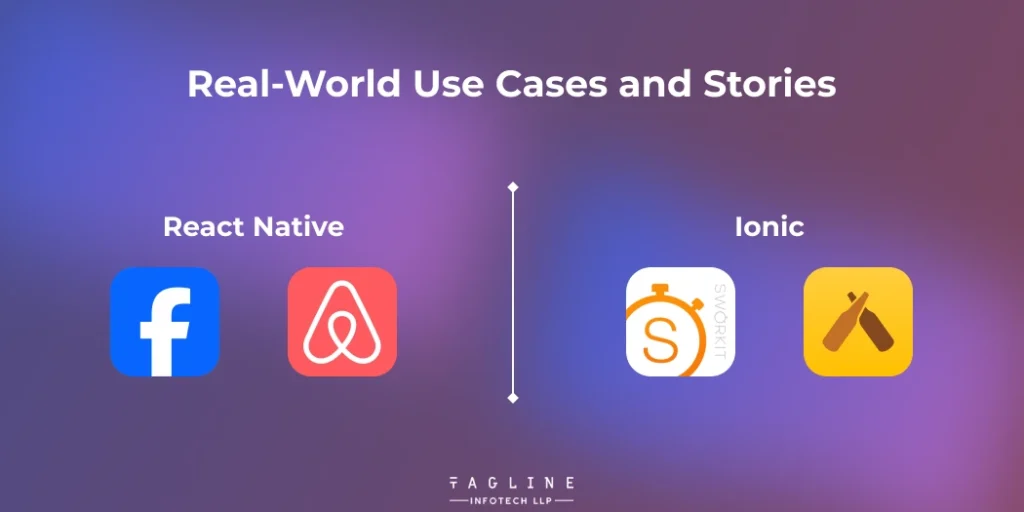Role of Python Libraries in Image Processing
October 30, 2025
Home >> React Native >> React Native vs Ionic: The Best Mobile App Framework in 2024

Are you considering creating a mobile application in 2024 but unsure which to choose—React Native vs Ionic?
Many companies face this challenge as cross-platform mobile development becomes increasingly popular. React Native and Ionic are tools for creating native mobile applications for iOS and Android platforms that use web technologies, including HTML, CSS, and JavaScript.
Which framework, then, ought you to choose for your upcoming project?
The response to this question will depend on your needs and priorities. react native ui components library offers better performance and provides a more native app-like experience since it can connect web code directly to native UI components.
With 2024 drawing near, both frameworks are expanding and improving their current functionalities. There isn’t a “best” option available. Consider your software’s needs, your team’s skills, and the time available for development.
React Native and Ionic are great options for quickly creating high-quality mobile applications. The most crucial stage is identifying the framework best suits your unique needs.
React Native is a cross-platform development framework (sometimes called a hybrid framework) that lets programmers create native applications using the React programming language. Bridging operates in the background of the user’s device and connects to the equipment’s native components.
When using React Native app development, developers can leverage JavaScript to construct mobile applications for iOS and Android. It facilitates cross-platform development by offering platform-independent native components that map to the platforms’ native user interface building blocks.

One app that uses React Native for its Ads Manager is Facebook. One software that doesn’t need this kind of introduction is Facebook.
Success Story: React Native’s ability to enable a unified and seamless experience across several platforms is partly responsible for the success of Facebook’s advertising business.
Airbnb international travel community has chosen to construct its mobile application using React Native.
Success Story: Airbnb uses React Native, significantly speeding up the development process. This allows Airbnb to manage changes and offer a consistent user experience.
Performance issues with React Native applications are a possibility, especially with older Android versions. This is because React Native interfaces with native components through a JavaScript bridge.
React Native applications often employ third-party libraries to provide functionality; nevertheless, there’s a chance that these libraries don’t work well with React Native. This likely leads to problems with compatibility and insufficient support for specific features.
It is possible that React Native applications won’t work with a certain device or operating system. Either a lack of required programming or hardware limitations are to blame.
React Native apps are very much larger than any other native apps which will effect the installation time.
Using the application in different operating systems and devices will pose challenges in performance.
Ionic React is an open-source user interface (UI) and native application programming interface (API) project for apps on iOS, Android, Progressive Web Apps (PWAs), and Electron. It utilises React and conventional web technologies to provide native capabilities and cross-platform UI components.
Furthermore, it provides an extensive range of UI elements readily interoperable with external libraries like Redux and React Router. These libraries facilitate state and route management at the proper application level. Furthermore, it claims that Capacitor is a native runtime that gives users access to a range of features, such as a file system, camera, and geolocation, to enhance an application’s usability and functionality.
Untappd is a popular beer discovery app that uses Ionic to meet its cross-platform development requirements.
Success Story: One factor contributing to Untappd’s immense popularity is that Ionic’s capabilities make a uniform user experience on iOS and Android possible.
The fitness app Sworkit is one example of a case in which Ionic’s features were used to meet its cross-platform needs.
Success Story: Sworkit created a fitness app that appeals to users worldwide thanks to Ionic’s user-friendly design and quick development capabilities.
Compatibility issues may arise when using third-party developers’ plugins or combining them with other frameworks, making resolution challenging.
Debugging can take a lot of effort and time because error messages are only sometimes clear to interpret.
You will find the learning curve relatively steeper for the complicated applications.
App design customization will also bring challenges for native solutions.
Even while the distinctions between React Native and Ionic are astounding, we should also remember many similarities between the two platforms.
From the basic descriptions, both platforms are similar for beginners. With React Native, you can create a native mobile application using JavaScript and the React JavaScript framework.
On the other hand, the Ionic development framework uses HTML, CSS, and JavaScript to enable the building of desktop, mobile, and web apps.
| Ionic | React Native | |
|---|---|---|
| Apps Nature | Hybrid apps | Cross-platform |
| GitHub Contributors | 243 | 1694 |
| GitHub Stars | 34k | 66k |
| Support and Communities | Stable and strong | Stable and strong |
| Developers | Drifty.co | Facebook Community |
| Purpose | written once and used anywhere | Learn once and write anywhere |
After we’ve reviewed the specifics of the Ionic vs. React Native comparison, let’s explore when it makes sense to use React Native.
Recognize when using Ionic is appropriate.
Move on to Ionic:
We may now conclude that both frameworks are optimal; as such, choosing one over the other is not straightforward. On the other hand, the project’s needs, functionality, and intended audience determine the app development framework.
Ionic is the finest choice if you have ready-to-use code and need to build an application quickly. However, React Native should be your first choice if you want to create an extremely feature-rich application that performs well and offers the user a remarkable experience.
If you are clear about your objectives, you can leverage the advantages that React Native provides for development, especially when working with a reputable React Native development company. Consequently, choosing a framework with more care would be wiser for you. After you’ve made the right decision, as a business owner, you next must get the right developers together to work on the app’s requirements.
Your development team’s experience and business needs ultimately dictate which React Native and Ionic framework to use. If native performance and strong community support are crucial, hiring React Native developers is the best choice for fulfilling your company’s objectives. Ionic is considered a good option if the concern is the budget. If you are a business owner, you need to look for project details and your team skill sets.
The Ionic uses web technologies like HTML, CSS, and JavaScript, which web professionals are already familiar with; learning how to use them may be easier for them. For individuals who possess expertise in Angular, Ionic could be a worthy substitute to consider. While React Native also uses JavaScript, some familiarity with React and native components is required. This could make the learning curve more difficult for people who have never worked with native code.
It is typically true that React Native offers better performance than Ionic. This is precisely because React Native apps use native components directly, which makes them more like native programs. On the other hand, Ionic applications render inside a web view, which could lead to certain speed limitations. React Native is usually preferred for applications with a lot of performance, like games or complicated animations, even though Ionic can still provide enough speed for most use cases.

Digital Valley, 423, Apple Square, beside Lajamni Chowk, Mota Varachha, Surat, Gujarat 394101
D-401, titanium city center, 100 feet anand nagar road, Ahmedabad-380015
+91 9913 808 2851133 Sampley Ln Leander, Texas, 78641
52 Godalming Avenue, wallington, London - SM6 8NW